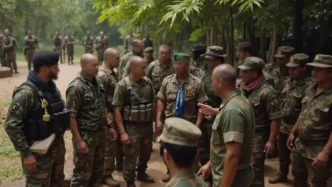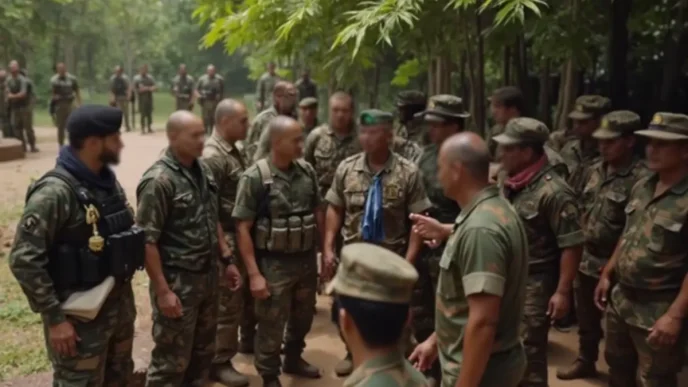The International Criminal Court (ICC) has confirmed the appointment of British-Israeli lawyer Nicholas Kaufman as the lead legal counsel for former Philippine President Rodrigo Duterte. This development, announced in a court filing dated 18 March before the ICC Pre-Trial Chamber I, marks a significant step in the ongoing proceedings against Duterte, who faces allegations tied to his controversial ‘war on drugs’ during his presidency from 2016 to 2022.
According to the ICC Registry, Duterte formally requested Kaufman’s representation in a signed letter on 14 March 2025. The appointment was finalised on 17 March after Kaufman accepted the mandate and fulfilled the necessary procedural requirements, including the solemn undertaking mandated by the ICC’s Code of Conduct for Counsel. This confirmation paves the way for Duterte’s defence in a case that has drawn intense international scrutiny over alleged human rights violations.
A High-Profile Defence in a Controversial Case
The ICC’s investigation into Duterte centres on accusations of crimes against humanity, specifically relating to extrajudicial killings during his administration’s anti-drug campaign. Thousands of deaths, many involving alleged drug users and dealers, have been documented by human rights groups, prompting the ICC to launch a formal probe in 2021 despite the Philippines’ withdrawal from the court in 2019 under Duterte’s directive. The case remains a lightning rod for debate, pitting issues of national sovereignty against international accountability.
Kaufman, a seasoned lawyer with dual British and Israeli citizenship, brings a wealth of experience in international criminal law to the table. While specific details of his prior cases are not publicly disclosed in this context, his appointment signals Duterte’s intent to mount a robust defence. The ICC filing notes that Kaufman’s acceptance of the role adheres to strict ethical guidelines, ensuring his commitment to represent the former president within the court’s legal framework.
The timing of this appointment comes amid reports of confidence from Duterte’s broader legal team, though challenges persist. Local media in Manila have highlighted that one member of the defence counsel has recently fallen ill, potentially complicating preparations. Nevertheless, the confirmation of Kaufman as lead counsel provides a focal point for the defence strategy moving forward.
Legal and Political Implications
The involvement of the ICC in the Philippines remains a contentious issue. Duterte has repeatedly dismissed the court’s jurisdiction, arguing that domestic mechanisms should handle any investigations into his policies. His administration’s withdrawal from the ICC in 2019 was seen by many as a direct rejection of international oversight, a stance that continues to resonate with his supporters. Critics, however, view the ICC’s persistence as a crucial step towards justice for victims of the drug war, many of whom were from marginalised communities.
For a global audience, it’s worth noting that the Philippines’ relationship with the ICC is shaped by complex legal and political dynamics. Under the Rome Statute, which established the ICC, the court can exercise jurisdiction over crimes committed while a state was a member, even if it later withdraws. This principle underpins the ongoing case against Duterte, despite Manila’s current non-membership. The appointment of Kaufman, therefore, not only represents a procedural milestone but also underscores the ICC’s determination to pursue accountability.
Analysts suggest that Kaufman’s role could influence the trajectory of the case in several ways. If his defence strategy challenges the ICC’s jurisdiction or focuses on procedural irregularities, it may delay proceedings or shift the narrative around Duterte’s culpability. Conversely, should Kaufman engage substantively with the allegations, it could lead to a more detailed examination of the evidence, potentially bringing greater clarity to the scale and nature of the alleged violations.
Broader Context of International Justice
The Duterte case is emblematic of broader tensions in international criminal justice. Across South East Asia, where national sovereignty often takes precedence over external intervention, the ICC’s actions are closely watched. In neighbouring countries like Myanmar, where allegations of genocide against the Rohingya have also drawn ICC attention, the outcomes of cases like Duterte’s could set precedents for how the court navigates politically sensitive investigations.
Moreover, the selection of a British-Israeli lawyer adds an additional layer of intrigue. Kaufman’s dual nationality and presumed familiarity with both common law and civil law traditions—common in international legal circles—may equip him to address the procedural nuances of the ICC. His background could also serve to internationalise the defence narrative, framing Duterte’s case within a wider discourse on state sovereignty versus global human rights norms.
For Filipino observers, however, the focus remains on the human cost of the drug war. Civil society groups and families of victims have long called for accountability, viewing the ICC as their last hope for justice after domestic efforts stalled. If Kaufman’s defence proves effective, it may reignite debates over whether international courts can—or should—override national systems in pursuit of justice.
Challenges Ahead for Duterte’s Defence
While Kaufman’s appointment is a procedural win for Duterte, significant hurdles remain. The ICC’s process is notoriously slow, often taking years to move from investigation to trial, and the complexity of gathering evidence in the Philippines—where local cooperation with the court is limited—could further prolong the case. Additionally, public sentiment, both domestically and internationally, remains sharply divided. X posts from Filipino users reflect a mix of support for Duterte’s hardline policies and outrage over the alleged killings, highlighting the polarised nature of the debate.
There is also the question of how Kaufman will navigate the political dimensions of the case. Representing a figure as divisive as Duterte requires not only legal acumen but also a keen understanding of the cultural and historical context of the Philippines. The drug war, while condemned by many, was framed by Duterte as a necessary response to a national crisis, a narrative that still resonates with a significant portion of the population.
Speculatively, if Kaufman’s strategy focuses on discrediting the ICC’s evidence or jurisdiction, it may bolster Duterte’s standing among supporters who view the court as an imperialist tool. However, such an approach risks alienating those who see the case as a rare opportunity for accountability. It must be emphasised that these outcomes remain hypothetical, with no confirmed evidence of Kaufman’s intended strategy at this stage.
Looking Forward
As the ICC proceedings advance, the appointment of Nicholas Kaufman as Duterte’s lead counsel marks the beginning of a new chapter in a saga that has already spanned years. For the former president, it represents an opportunity to formally contest the allegations against him on an international stage. For victims and their advocates, it is a reminder of the long road to justice, one fraught with legal and political obstacles.
The case also serves as a litmus test for the ICC’s relevance in a region where its authority is often questioned. South East Asia, with its diverse political systems and histories of conflict, presents unique challenges for international justice mechanisms. Whether the court can balance respect for national sovereignty with the pursuit of accountability will likely shape its legacy in the region for years to come.
In Manila, the story continues to unfold against a backdrop of grief, defiance, and hope. As Kaufman prepares to represent Duterte, the eyes of the world remain on the Philippines, watching to see whether this high-profile case will deliver closure—or deepen existing divides.














